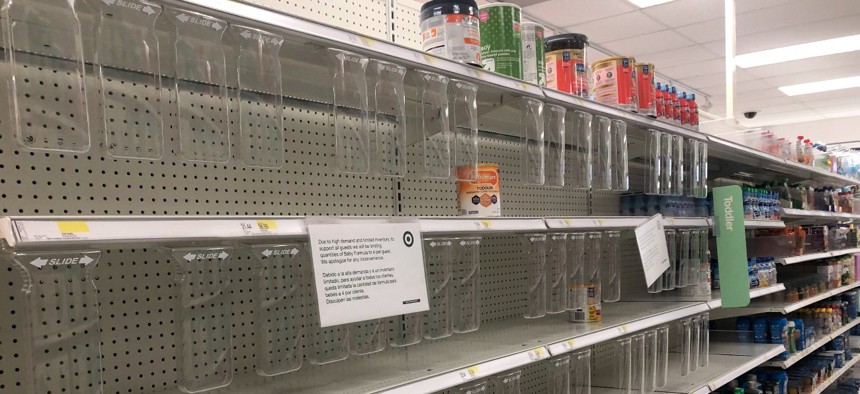The Latest on the Formula Shortage and What the Government is Doing About It
Republican lawmakers are demanding a briefing and internal communications from the White House on the shortage.
The Biden administration has taken a multi-faceted approach to alleviating the formula shortage, although the president has come under fire for not knowing sooner how severe it was. Here are the latest updates on the federal government’s response, what lawmakers have done recently and the status of the manufacturing plant at the center of the crisis.
Status of the Abbott Plant
Abbott Nutrition’s plant in Michigan, which has been at the center of the crisis, restarted production of EleCare and other specialty and metabolic formulas on June 4 after temporarily closing in February, with the intention of restarting production of other types of formula as soon as feasible. Then production was paused on June 15 due to floods in part of the facility caused by severe thunderstorms and heavy rains in southwest Michigan.
“We’re working to restart production as soon as we can—we don’t have any further updates at this time,” John Koval, director of public affairs for Abbott, told Government Executive on Monday. The FDA deferred to Abbott when asked for comment.
Formula Brought from Abroad
There are currently two Operation Fly Formula flights scheduled for the week of June 27, which are expected to bring in about 4.3 million, 8-ounce bottle equivalents of formula to the United States.
“By July 3, Operation Fly Formula flights will have completed 37 flights and imported more than 37.2 million 8-ounce bottle equivalents of infant formula,” according to a press release from the Health and Human Services Department.
The FDA’s Investigations and Flexibility to Increase Product Supply
The FDA said in a news release on June 22 that to-date it has investigated 129 complaints associated with Abbott Nutrition’s formula; 119 of which were reported after Abbott voluntarily recalled some product in February.
Previously, the FDA reviewed complaints related to nine infant deaths, two of which were associated with the investigation of the Abbott Nutrition plant in Sturgis, Mich., “and despite extensive investigation the evidence does not rule in or rule out a definitive link between these infant deaths and the product produced at [the] plant,” the release stated.
“The agency was notified of one additional consumer complaint on June 10, 2022, that resulted in an infant death in January 2022,” the FDA continued. “The agency has initiated an investigation, given that the complaint referenced that the infant had consumed an Abbott product. However, the investigation of this most recent consumer complaint is in its preliminary stages and the agency will provide an update as it learns more.”
As for the flexibilities the FDA has issued in order to make more formula available, that has resulted in about 365 million-full size, 8-ounce bottles to be imported from six countries. “These products have already started to hit the U.S. market and more will appear on store shelves over the coming weeks and months,” the FDA said.
New Contract Awarded to Study the Formula Supply Chain
On June 14, the FDA awarded an approximately $71,000 contract to NielsenIQ, a consumer intelligence company, to over a fourth month period, “monitor and analyze the status of infant formula supply chain impacts and respond to White House requests on the outbreak” of infant illnesses related to formula.
“The decision to move forward and deploy NielsenIQ data sets to help understand Infant Formula performance and product availability because the NielsenIQ retailer supplied data is the trusted source of true of nearly 85% of all [consumer packaged goods] manufacturers, Wall Street, and many other providers in the [consumer packaged goods] industry,” said the contract justification. “Acquiring NielsenIQ data directly streamlines the acquisition of this retailer data and provides fair and reasonable pricing to the government.”
Politico, which first reported on the contract, said this “comes after White House officials privately admitted to POLITICO that incomplete data on retail stocks slowed their response after the shutdown and recall of formula from a key Abbott Nutrition manufacturing plant in mid-February.”
House Republicans Demand a Briefing and Internal Communications from White House
Reps. James Comer, R-Ky., ranking member on the House Oversight and Reform Committee, and Michael Cloud, R-Texas, ranking member of the committee's Economic and Consumer Policy, wrote to Ron Klain, White House chief of staff, on June 23 re-upping their request for a staff level briefing (by June 30) and all communications between the White House, the Food and Drug Administration, and the Health and Human Services Department regarding the formula shortage. They previously asked for these things in a letter on May 20, but claimed he did not respond.
“The White House has repeatedly said they have been working around the clock since February to address the issue. Yet, despite the FDA and HHS being aware of the formula shortage last year, and company executives warning that the Abbott plant’s closure would immediately have significant repercussions, President Biden conceded he did not become aware of the shortage until April 2022,” Comer and Cloud wrote. “Furthermore, the White House did not take steps to address this crisis until May 2022. These steps were too late for desperate parents.”
Government Executive asked the White House for comment on the letter, but it did not immediately respond for comment.
More Congressional Action
Last Thursday, the Senate passed bipartisan legislation that would lift tariffs on baby formula importation for a 90-day period and decrease the costs to retailers as they attempt to keep their shelves stocked. A companion version was introduced in the House, but has not been voted on yet.




